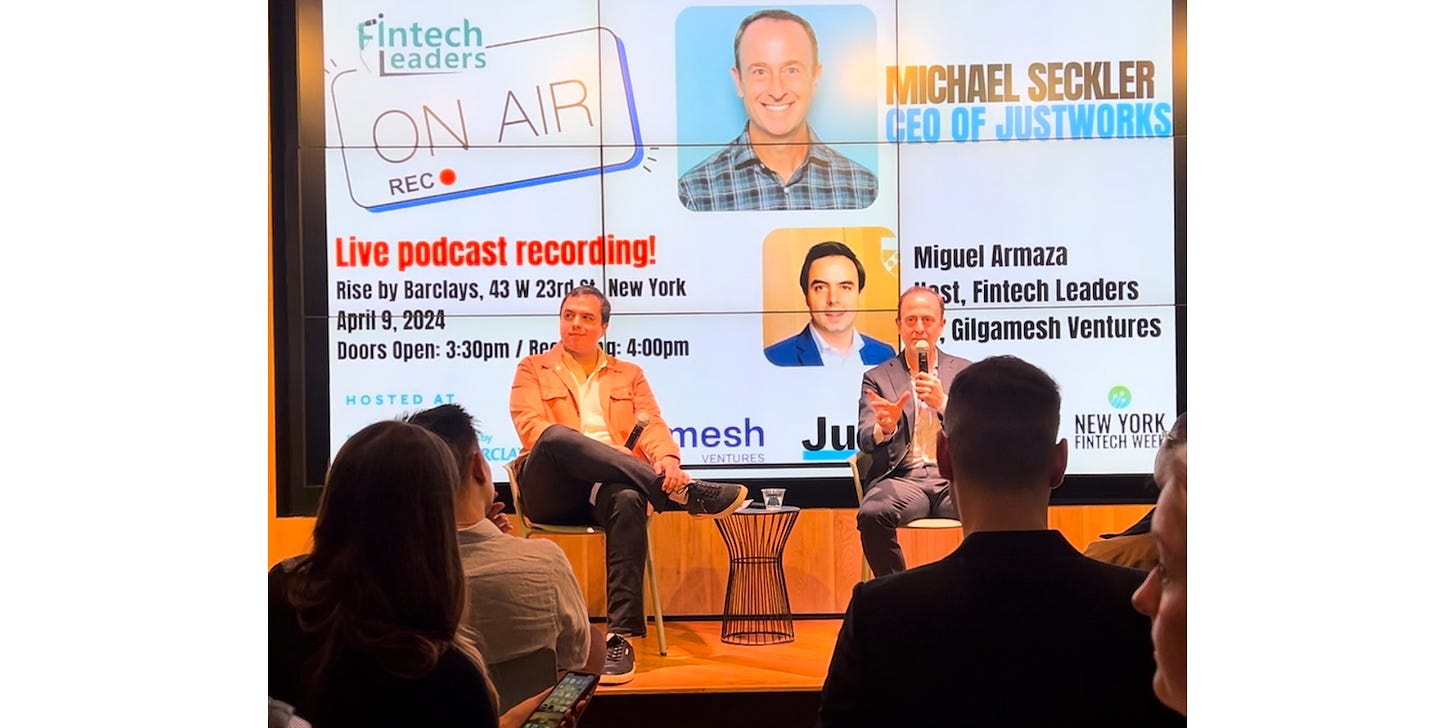This article is part of Fintech Leaders, a newsletter with almost 65,000 builders, entrepreneurs, investors, regulators, and students of financial services. I invite you to share and sign up! Also, if you enjoy this conversation, please consider leaving a review on Apple Podcasts, Spotify, or wherever you get your shows so more people can learn from it.
Mike Seckler is the CEO of Justworks, one of the largest platforms for SMBs providing HR, Tax, and payroll services in the US and Internationally.
Founded in 2012 in NYC, Justworks recently crossed $300 million in annual revenue and is backed by some of the best NY-based VCs, including Bain Capital Ventures, FirstMark, Thrive Capital, Union Square Ventures, Index, and Redpoint.
We recorded this conversation live in the heart of NYC at Barclays Rise, as part of New York Fintech Week. Mike was outstanding and he delighted a room full of 100 fintech entrepreneurs and builders. I’m sure you’ll be delighted as well.
In this episode, we discuss:
The secret to success of great entrepreneurs
“If you're going to create something great, there's going to be pressure involved. If you're going to start a company and get it to a good outcome, or eventually take it public, you're not just in the 1%.”
Mike has been building and leading tech companies for almost thirty years. He’s seen it all and he is convinced great entrepreneurs distinguish themselves by their unwavering belief in a vision and their unique ability to adapt when reality challenges their initial assumptions. Great founders possess the intellectual stamina to repeatedly recalibrate their strategies as the realities of the market shifts and challenges their assumptions. This iterative process involves taking the core elements of their vision that remain viable (often a small fraction of the original plan) and adjusting their approach based on learned experiences. This capacity to pivot, not just once but multiple times throughout the lifecycle of a venture, often spells the difference between enduring success and failing in the face of adversity.
Another critical differentiator of great company founders is their passion for the work and mission. Seckler is convinced that true entrepreneurial spirit often emerges not from the pursuit of financial gain alone but from a profound passion for the venture. This passion fuels their resilience and provides a competitive edge, especially against those who might not share the same level of commitment or who might be doing it for different reasons.
How to run a functional board of directors
“Some of the dysfunction in boards that I see in the startup community are the founders faults. And it happens in two ways…”
“A lot of CEOs don't get energy from their boards, and that's a shame because it can be architected that way.”
Mike has been a member of several boards of directors and he’s learned that functional boards have strategic composition and are run very intentionally. The composition of the board is critical. Functional boards are crafted with intentionality, selecting members for their alignment with the company's core goals and values. In addition, effective board meetings require meticulous preparation and active engagement. At Justworks, they make sure that detailed materials are distributed well in advance, with the expectation that board members will review them and will attend the meeting prepared and informed. Meetings are strategically structured to maximize productivity and active engagement from each member.
The Power of focusing on one product for a long time
“As a board and leadership team, we said, it doesn't matter what the VCs are saying, we're going to stay in New York until we get to $10 million in recurring revenue. When we get to $10 million, we've earned the right to go to our next market. And some VCs didn't want to invest in that. They missed out.”
In the early days of Justworks, they faced an important decision. Stay focused on serving New York City clients or expand across the US. At this point, Justworks’ revenue was in the range of one to two million dollars, and they started to face pressure from VC investors to expand beyond their primary market of New York City to demonstrate scalability. Despite external pressures, the board of directors decided to concentrate their efforts on strengthening their presence in New York until they reached ten million in recurring revenue. They made this decision despite the risk of losing potential investors who were not in favor of this approach. But the strategy paid off, as it allowed Justworks to solidify its business model and establish a stronger foundation for eventual expansion.
Successfully managing the pre and post-merger integration… and a lot more!
Before finalizing any merger or acquisition, Mike advocates company leaders should conduct a comprehensive visioning exercise among key stakeholders from both companies involved. This involves writing and sharing memos outlining each party's vision for the combined entity, expectations, and potential reporting structures. Critically, these memos should also consider reasons why the merger might fail. This exercise facilitates open and vulnerable discussions that reveal and address areas of misalignment before they escalate into conflict post-merger. Understanding and agreeing on what success looks like and acknowledging potential pitfalls upfront, can ensure that both teams are aligned, significantly reducing the likelihood of "self-inflicted wounds" that often cause integrations to fail.
Justworks recently acquired Via to strengthen the company’s international efforts and Mike shared the story on how they conducted this visioning exercise with Via founders, Maite and Itziar Diez-Canedo.
Want more podcast episodes? Join me and follow Fintech Leaders today on Apple, Spotify, or your favorite podcast app for weekly conversations with today’s global leaders that will dominate the 21st century in fintech, business, and beyond.
Previous Episodes You May Enjoy:
Video Highlights You Will Definitely Like:
Miguel Armaza is Co-Founder & General Partner of Gilgamesh Ventures, a seed-stage investment fund focused on fintech in the Americas. He also hosts and writes the Fintech Leaders podcast and newsletter.



























Share this post